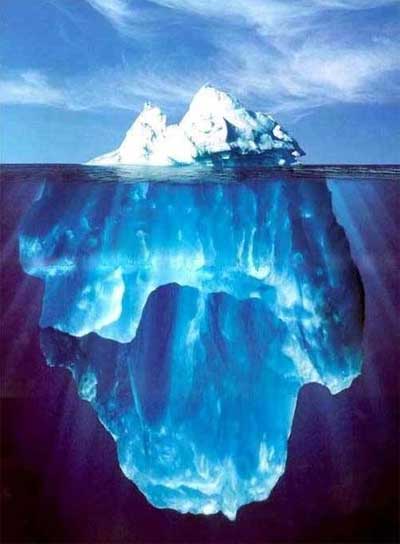

“Ecological accounting informs” us-- that is to say makes a sensitive receiver aware of the surrounding conditions. Places tell us things if we can hear their stories.
All life exquisitely adjusts to its surroundings in a script written in its genes by the sun, microbes, and nutrients, and retrieved by proteins from a vault of adaptive responses we refer to as a species genome. The genome is a record of the past. A junk yard of spare parts, and a down payment on the future probabilities a new life may grow to enrich or to degrade its surroundings.
Plants in an area are just the tips of the ecological accounting iceberg. Also Leopold called it a pyramid, the land pyramid, but we only see what the insects and plants have brought to “fruition” after millions of years of working together -- that is the flowers, shrubs, trees and vines in a bewildering array of staggering variety.
Why just the tip?
Well, we don’t see the photons, we can’t taste, see or smell the carbon dioxide and we may only sense the cold wetness of the moisture soil may or may not contain. Nevertheless, any plot of land is a storehouse of carbon for future use. The biological wealth is stored in accounts in the bank we call the landscape. |
 |
We, like our animal ancestors, may be able to smell the richness and almost taste the wealth of decay that forms and enriches the soil from which we all draw life. However, we have lost the capacity to sense our world with smelling. We have lost the capacity to almost taste rich soil where salamanders, skinks and snakes wallow in this “tangled bank” that represents the wealth of nature, or at least one of nature’s storehouses. No one sends you to school to learn how to smell or taste things but in a garden one may with hands, and head, and sensory organs extend our comprehension that something intangible and ineffable is going on as light descends and water rises moving nutrients through a performance. This --a choreography of chemicals— is like an audition for a pageant. Light and water are either absorbed or reflected by the “lowly dirt:” and, in that retention sufficient to spark new life, there is a world born here of relentless cycles, unvarying limitations and boundless opportunities, if the surrounding conditions match the genetic potential of the creature. That is how nature (ecology) notifies us, tells us, “informs” you if one place in which to plant the future life we seek to nourish is optimal over another place (oikios topos" ) Theophrastus called it more than two thousand years ago in the botanical garden he tended for Aristotle.
Creatures and conditions in an endless progression of generation after generation is really how the soil grows rich enough to nourish us. Land is the vessel into which you may want to place your hopes, in the form of plants --small treasures though they be-- to see if they and their seeds will take root or rot. That is step one in the lesson of ecological accounting : where you put your investment of time and genes (plants) is crucial to future life. Garden well and the insects can do their miraculous work of cleaning and fertilizing our land so that plants, bacteria and molds can create the oxygen infused and nitrogen enriched air we breathe. |
|
631 words, 17 November 2006